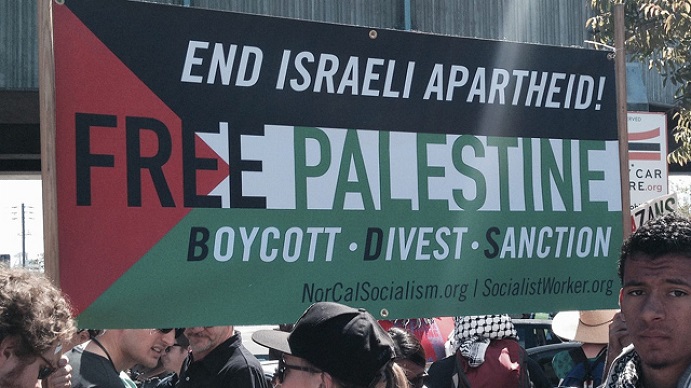Asa Winstanley
Middle East Monitor / January 29, 2022
Where in the world exists the most repression of solidarity with the Palestinian people?
The correct answer, of course, is within occupied historical Palestine itself.
Palestinians are subjected by the Israeli regime to a military dictatorship in the West Bank, a brutal siege and periodic massacres in Gaza and systemic discrimination amounting to apartheid in the whole of historical Palestine (including in the 1948-occupied territories, which some refer to as “Israel”).
Israeli governments of all stripes ruthlessly suppress Palestinian activism of any and all kinds. When I lived in the West Bank, I often saw this. Palestinians could be holding the smallest, non-violent, placid demonstration against Israeli occupation and settlements, and it would still be outlawed by Israel military decree.
Even symbolic tree planting to reclaim land, accompaniment of Palestinian children walking to school in danger of settler attacks and other such peaceful activities were habitually banned, usually under the pretext of the area conveniently being designated a “closed military zone”. Palestinian student activism is outlawed, with elected student leaders, candidates and organizers on campus being arbitrarily rounded up and thrown in jail without trial by Israeli occupation thugs.
And even Palestinian “citizens” of Israel – who theoretically have more rights under the Israeli regime than Palestinians in the West Bank or Gaza – are still treated as less than second or third-class citizens. Solidarity organizing and protest with their brothers and sisters in the rest of historical Palestine is outlawed, criminalized and punished – sometimes even with lethal violence.
Such was the case during the massive pan-Palestinian national uprising that broke out all over historical Palestine in May last year, in response to Israeli violence in Jerusalem and Gaza.
Palestinian citizens of Israel in cities, towns and villages all over present-day Israel came out onto the streets to protest Israeli violence in Jerusalem and Gaza. However, they were violently suppressed by Israeli army thugs and Zionist extremist militias, many of whom came from some of the West Bank’s most extremist Israeli settlements.
Mobs of Jewish Israelis organized themselves in WhatsApp and Telegram groups writing that they were “dying to kill Arabs” and “We are no longer Jews today… Today we are Nazis.”
Meanwhile, mainstream Israeli radio hosts openly incited pogroms against Palestinian citizens, threatening to inflict a new Nakba on them. The Nakba was the Palestinian Catastrophe of 1948 when a majority of Palestinians were expelled from Palestine by the Zionist militias, which then formed the basis of the new Israeli army.
Therefore, there is little doubt that the Israeli regime that rules occupied Palestine is today the most oppressive place in the world for Palestinian solidarity.
But in close second place comes Germany – the country where Nazism originates.
Anti-Palestinian feeling in Germany is extreme. German local and federal governments have attempted to take measures banning the BDS movement, which calls for boycott, divestment and sanctions against Israel.
All over the Western world today, Israel and its lobby attempt to impose its will, smearing any form of solidarity with the Palestinians as “anti-Semitism”. This is a terrible lie, but in few places does this lie have a more receptive audience than in Germany.
The historical stain of Nazism – and the six million Jews it murdered during the Holocaust – means that many Germans today (wrongly) see support for Israel as a way to atone for their country’s past crimes.
But Zionism (the movement that expelled the Palestinians and birthed Israel) is not a repudiation of Nazism, but rather a particular expression of its victory.
After all, both the Nazis and the Zionist movement agreed on the goal of removing Europe’s Jews from their homelands. Hitler’s Nazi government, prior to World War II, even collaborated directly with the German Zionist movement. The infamous Ha’avara Agreement meant a massive transfer of the resources of the richest German Jewish citizens to the settler-colony in Palestine.
Collaboration was by no means limited to Ha’avara, and some Zionist-Nazi contacts even continued right up until the end of the Holocaust – at the expense of the lives of some half a million Hungarian Jews (while many Zionist leaders escaped with the agreement of senior Nazis).
All this is a sort of forbidden history that is practically prohibited to speak of, even in Britain (as the purging of Ken Livingstone showed) – let alone in Germany.
That’s why it was brilliant to read this week that BDS activists in Germany had won an important victory.
The city government of Munich had banned a debate on an anti-BDS resolution they imposed in 2017. But a German federal court has now declared Munich’s anti-BDS policy a violation of “the fundamental right to freedom of expression”.
Perhaps there is hope yet for de-Nazification in Germany.
Asa Winstanley is an investigative journalist living in London who writes about Palestine and the Middle East













